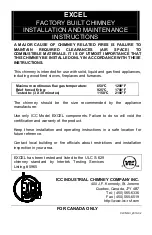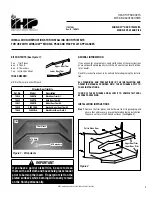
If possible, you should choose a location where
the chimney will pass through the house without
cutting floor or roof joists (see fireplace dimen-
sions Page 10).
Usually, no additional floor support is needed
for the fireplace. The adequacy of the floor
can be checked by first estimating the weight
of the fireplace system. Weights are given
on Page 21. Note the floor construction and
consult your local building code to determine
if additional support is needed.
The fireplace may be installed directly on the
floor or on a raised base (for proper guidelines,
refer to “Hearth Extension Requirements”) and
a minimum of 6’8” (2 m) measured from the
base of the appliance to the ceiling is required.
When selecting the location, the chimney outlet
position and the direction of the wind are impor-
tant factor affecting the chimney performance.
To allow a maximum draft and to reduce wind
turbulence, the chimney must:
• Penetrate the highest part of the roof.
• Be installed as far as possible of roof offsets,
trees or any other obstructions that may
cause wind turbulence and back drafts in
the chimney.
• The least amount of offsets (elbows) pos-
sible. NOTE: A maximum of 2 offsets is
allowed.
GLASS CARE
Glass Replacement
The glass used for the fireplace is a high tem-
perature ceramic glass (1,400° F / 760° C). If the
glass breaks, it must be replaced with an identi-
cal ceramic glass. Tempered glass or ordinary
glass will not withstand the high temperatures
of the fireplace. Replacement glass should be
purchased from a IHP dealer (see “Replacement
Parts”, Page 21). DO NOT OPERATE THE UNIT
WITH CRACKED OR BROKEN GLASS.
Glass Cleaning
The fireplace is designed to keep the glass
clean under normal operating conditions. If
the fireplace is operated continuously with the
combustion air controls closed, the glass will
tend to get dirty unless the fuel, firebox and
glass are maintained at hot temperatures (see
“Refueling For Best Performance”). To clean the
glass, there are a number of specially designed
cleaners. Your authorized IHP dealer can recom-
mend a suitable cleaner which is available in
your area. Regular household glass cleaners
will not clean creosote. Do not use abrasives
such as steel pads, steel wool or oven cleaner
as they will scratch the glass.
DO NOT USE CHEMICAL GLASS CLEANERS
ON PAINTED SURFACES AS IT MAY CAUSE
THE PAINT TO PEEL.
CAUTION : DO NOT ALLOW WINDOW CLEANER
TO GET IN CONTACT WITH DOOR GASKET OR
PAINT ON FACADE OR DOOR. ONCE CLOSED,
CONTACT OF GLASS CLEANER WITH THE
FIREPLACE FACADE CAN PROVOKE PAINT
PEELING OFF.
Gasket
Length Dimensions
Part No.
Steel Door
Around
Glass
69
(1753)
1 x 3/16
(25 x 4.8)
PR-SR1685D
On Door
Frame
73
(1854)
5/8 dia.
(15.9)
PR-SR1823G
Cast Door
Around
Glass
69
(1753)
1 x 5/16
(25 x 4.8)
PR-SR1823H
On Door
Frame
73
(1854)
5/8 dia.
(15.9)
PR-SR1823G
Table 1
Inches (millimeters)
FIREPLACE INSTALLATION
Locating The Fireplace
The best location to install your fireplace is
determined by considering the location of
windows, doors, and the traffic flow in the room
where the fireplace is located, allowing space
in front of the unit for the hearth extension and
the mantel, and taking into consideration the
location of the hot air ducts (optional), outside
air kit and chimney.
Gasket Replacement
Remove the door from the unit (see Page 7)
and lay it on a clean unabrasive surface. To
replace the gasket, first remove all of the old
gasket and gasket cement. Make sure that the
surface is totally clean before applying new
cement (a high temperature silicone caulking
rated at 500° F [260° C], is suitable) or adhesion
problems may result. Apply gasket cement to
the gasket channel and install the new gasket.
This replacement part is available from your IHP
dealer in the following dimensions:
Marginal Location
Wind Direction
Location
Not
Recommended
Outside Air Intake
Facing the Wind
Location
Not
Recommended
Location Recommended
Figure 10
9










































